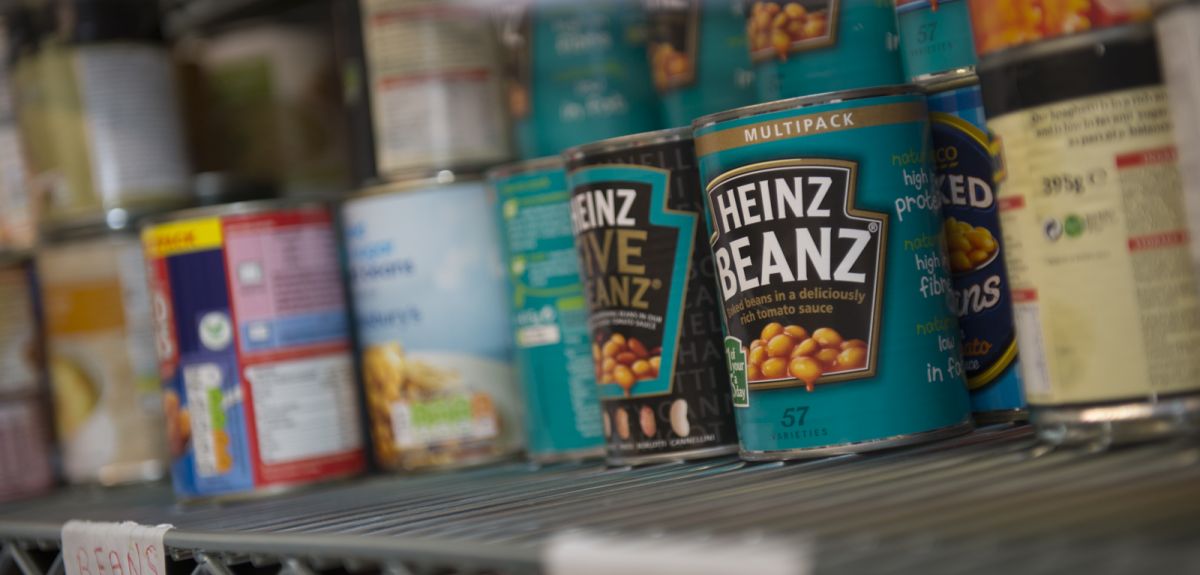
Credit: West Cheshire Foodbank/ Luke Richards
'One in three foodbank users is a child'
Researchers from Oxford and Chester Universities have systematically identified the characteristics of people who use food banks in the UK, looking at why they need to resort to the emergency food parcels. Last year, nearly 2,900 three-day food supplies were handed out in West Cheshire in North West England. The research shows that one in three people using the foodbank in West Cheshire was a child.
The West Cheshire Foodbank in North West England, part of the UK-wide Trussell Trust Foodbank Network, provided the statistical data used by the researchers. The growth of emergency food provision in West Cheshire reflected the national picture overall, says the study. The researchers explored trends in recent years in the provision of emergency food in West Cheshire. They also drew on more detailed data from West Cheshire Foodbank concerning the reasons for referral and how long people expected their income crisis to last between May 2014 and April 2016.
The results show that benefit delays accounted for one in five referrals, while benefit sanctions resulted in one in 12 referrals, with one fifth of those affected by sanctions being children. Although a large proportion of food parcels were concentrated in highly disadvantaged wards of Cheshire West and Chester, a crisis can hit anyone as food parcels were distributed to people living in all 46 wards, including more prosperous areas, says the research. Younger adults, aged 17-24, and those of working-age, aged 25-64 were typically referred because of problems with their benefits. Meanwhile, those aged 65 and over sought emergency food because of debt or low incomes, in many cases.
Debt accounted for 16% of referrals overall. One fifth of referrals were to those citing low incomes as their reason for seeking emergency food, with a similar proportion being referred due to benefit delays. Benefit changes and sanctions accounted for 14% and 7% of referrals, respectively, according to the report.
These findings show there are huge levels of poverty – even in a country as wealthy as ours. The results suggest that policymakers need to look again at the way the benefits system operates, and ensure that people in work are paid a wage they can live on.
Dr Elisabeth Garratt, research fellow at the Centre for Social Investigation at Nuffield College
Crises due to benefit changes and delays typically lasted one to four weeks. The length of time in crisis for people experiencing a sanction was noticeably longer than other referral reasons. Sanctions were more likely than any other reason for referral to result in an income crisis lasting 13 weeks or longer (13 per cent). Otherwise, many crises resulting out of a low income were short-term, the research shows.
Report author Dr Elisabeth Garratt, research fellow at the Centre for Social Investigation at Nuffield College, said: 'We find that emergency food referrals rose in 2016 and there is every indication that foodbanks are here to stay. One in three of those receiving emergency food from West Cheshire Foodbank in the last year was a child. These findings show there are huge levels of poverty – even in a country as wealthy as ours. The results suggest that policymakers need to look again at the way the benefits system operates, and ensure that people in work are paid a wage they can live on.'
The researchers worked with local advice services to devise a detailed coding system that allowed them to investigate reasons for referrals. All personal identities remained anonymous, but the researchers were able to study the characteristics of people accessing emergency food in West Cheshire, as well as reasons for referral, and the length of the crises.
The report, #stillhungry, is available here.
 New Year Honours 2026
New Year Honours 2026
 New study estimates NHS England spends 3% of its primary and secondary care budget on the health impacts of temperature
New study estimates NHS England spends 3% of its primary and secondary care budget on the health impacts of temperature
 International collaboration launches largest-ever therapeutics trial for patients hospitalised with dengue
International collaboration launches largest-ever therapeutics trial for patients hospitalised with dengue
 Oxford-built multi-agent assistant for cancer care to be piloted in collaboration with Microsoft
Oxford-built multi-agent assistant for cancer care to be piloted in collaboration with Microsoft